| Seite 7 |
Time and Activities
Aktivitäten
 Tennis spielen Ihr spielt Tennis. |  Musik hören Sabrina hört Musik. |  lernen Brigitte lernt in der Bibliothek (in the library). |
 joggen gehen |  jobben / arbeiten |  ins Kino gehen |
 ins Bett gehen |  Fußball spielen | 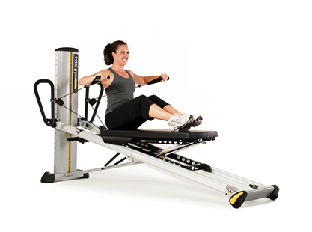 Fitnesstraining machen |
 feiern / eine Party machen |  essen* (in der Mensa essen) |  Computerspiele spielen |
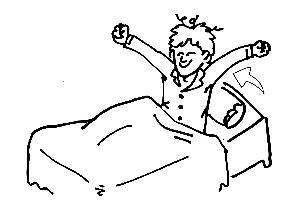 aufstehen* | 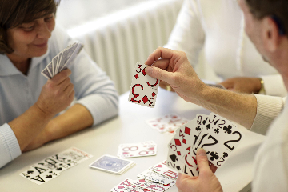 Karten spielen | 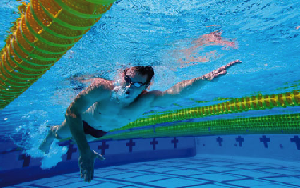 schwimmen gehen |
Just as with the verbs on a previous page (Seite 5), these verbs (with an exception) follow the regular pattern:
| ich spiele (-e) | wir spielen (-en) |
| du spielst (-st) | ihr spielt (-t) |
| sie spielt er spielt es spielt (-t) | sie spielen (-en) |
Übung 1-7a. Was machen diese Leute? (What are these people doing?) Complete this exercise on BOLT. Use the elements to construct sentences. The punctuation, spelling, and verb agreement must all be correct. Beispiel: du / spielen / Tennis → Du spielst Tennis.
- ich / spielen / Fußball
- wir / machen / eine Party
- Arno / spielen / Computerspiele
- ihr / gehen / schwimmen /
- du / hören / Musik
- Sie / lernen / in der Bibliothek (in the library)
- Elke / machen / Fitnesstraining /
- Jakob und Grete / spielen / Karten
Ja-Nein-Fragen (Yes-No Questions)Questions requesting a "yes" or "no" answer start with a verb. This can be confusing when formulating the question in German, because most of these questions in English are either present emphatic (Do you live in Bloomsburg?) or present progressive (Are you living in Bloomsburg?), but not regular present (Live you in Bloomsburg?). In German there is no emphatic or progressive; yes/no questions can ONLY be formulated with the only present tense German has: "Wohnst du in Bloomsburg?". |
Übung 1-7b. Ja-Nein-Fragen (on BOLT) Translate the following questions into German. For example: "Do you play Tennis?" → "Spielst du Tennis?". Make sure to use punctuation and capitalize nouns.
- Are you listening to music?
- Do you work?
- Are you going jogging?
- Are you going to bed?
- Do you do fitness training?
- Are you going swimming?
- Do you play computer games?
- Are you going to the movies?
nicht...when negating an actionIn German, the word "nicht" most often comes at the end of the sentence, when negating an action. For example, to say "I am not listening to music" → Ich höre Musik nicht. Ich spiele Computerspiele nicht. Depending on the meaning, "nicht" may also precede a prepositional phrase:
For activities that are paired with "gehen" (joggen gehen, schwimmen gehen), "nicht" comes before the activity verb:
|
Übung 1-7c. Nein, ich mache das nicht. (on BOLT) Answer the questions in Übung 7-b, saying you are not doing these things. For example: Ich spiele Karten nicht.
- Hörst du Musik? → Nein, ich _____________________________.
- Arbeiten Sie?
- Geht ihr joggen?
- Geht ihr ins Bett?
- Machst du Fitnesstraining?
- Geht ihr schwimmen?
- Spielen Sie Computerspiele?
- Geht ihr ins Kino?
*Two "Different" Verbs: aufstehen and essenThe verb aufstehen means "to get up" as in "to get up from sleeping" or "to stand up".
The verb essen means "to eat". It is a "strong verb". Strong verbs will be discussed in greater detail later. The main concept here is the different conjugation form:
|
||||||||||
Clock Time and Times of the Day
- There is no "AM" or "PM" in German. In formal situations, such as in schedules, German uses the 24-hour clock.
- In colloquial German, the 24-hour clock is used when it is not clear whether the time is in the morning, afternoon, or evening.
- The word for "o'clock" is "Uhr".
- The word for "clock" is "die Uhr"
- The question "What time is it?" = "Wie viel Uhr ist es?"
- The question "At what time...?" = "Um wieviel Uhr...?" Um wieviel Uhr spielen wir Karten? More generally, one may ask "Wann"? (when), which as in English is general and could be asking for time, day, month, year, etc.
- "At", as in "at three o'clock" is "um" in German, as in "um drei Uhr". Wir spielen Karten um drei Uhr.
- When writing time, the hour and minutes are separated by a period: 2:00PM = 14.00 in German.
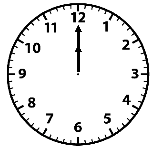 Es ist zwölf Uhr. Um wieviel Uhr essen wir? Wir essen um zwölf Uhr. | 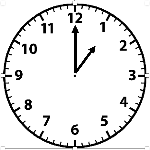 Es ist ein Uhr. Um wieviel Uhr spielt ihr Tennis? Wir spielen Tennis um ein Uhr (short form: um eins) 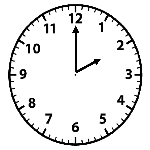 Es ist zwei Uhr. Um wieviel Uhr schwimmst du? Ich schwimme um zwei Uhr. 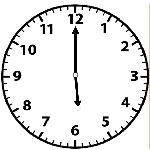 Es ist sechs Uhr. Um wieviel Uhr lernt Sara in der Bibliothek? Sara lernt um sechs Uhr in der Bibliothek. | ||
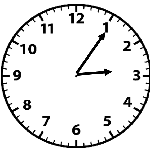 Es ist fünf nach drei. |
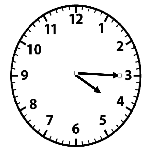 Es ist viertel (quarter) nach vier. |
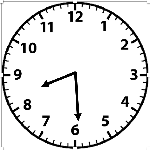 Es ist halb neun. |
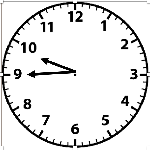 Es ist viertel vor zehn. |
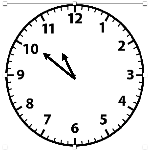 Es ist zehn vor elf. |
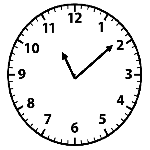 Es ist zehn nach elf. |
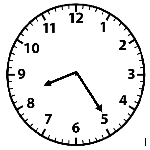 Es ist fünf vor halb neun. |
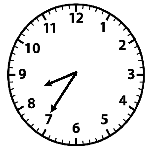 Es ist fünf nach halb neun. |
Übung 1-7d. Wieviel Uhr...? Complete the exercise on BOLT. Write out the times. For example: Es ist zehn Uhr fünfzehn. OR Es ist viertel nach zehn.
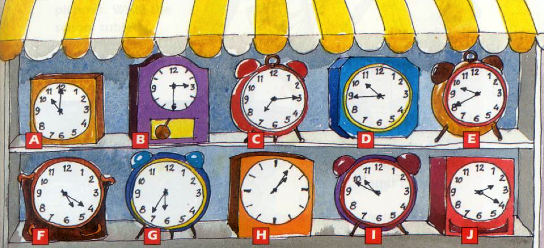
- _________________________________________________________________________________________
- _________________________________________________________________________________________
- _________________________________________________________________________________________
- _________________________________________________________________________________________
- _________________________________________________________________________________________
- _________________________________________________________________________________________
- _________________________________________________________________________________________
- _________________________________________________________________________________________
- _________________________________________________________________________________________
- _________________________________________________________________________________________
-
Übung 1-7e. Um wieviel Uhr...? Partnerarbeit: "Uhrzeiten erfragen und nennen". Teil A. Teil B ist auf Seite 11.
- Um wieviel Uhr steht Herr Fischer auf? Herr Fischer steht um halb sechs (um fünf Uhr dreißig) auf.
- Um wieviel Uhr isst Beate Frühstück? Beate isst Frühstück um viertel nach sieben (um sieben Uhr fünfzehn).
- Um wieviel Uhr hörst du Musik? Ich höre Musik um neun Uhr zwanzig.
- a. 8.45 / b. 4.58 / c. 18.45
- a. 17.32 / b. 7.23 / c. 7.32
- a. 1.15 / b. 15.01 / c. 5.01
- a. 2.21 / b. 21.02 / c. 20.21
- a. 5.36 / b. 6.53 / c. 3.56
-
Anna und Daniel spielen am Montag Tennis.
- um 8.15 Uhr
- um 15.08 Uhr
- um 18.15 Uhr
- David und Daniel gehen am Dienstag ins Kino.
- um 7.45 Uhr
- um 8.45 Uhr
- um 8.15 Uhr
- Daniel und Felix sehen Professor Lange am Freitag.
- um 5.06 Uhr
- um 16.05 Uhr
- um 6.05 Uhr
- David und Daniel spielen am Samstag mit Felix und Anna Fußball.
- um 9.30 Uhr
- um 18.30 Uhr
- um 8.30
- Rule: The verb is always SECOND. In regular simple sentences, the word order can be either subject-verb-other [object, time, location, etc.] But if "other" comes first, then the word order is other-verb-subject.
- Examples: 1) Heike spielt Tennis heute Morgen. 2) Heute Morgen spielt Heike Tennis. 3) Tennis spielt Heike heute Morgen.
- Difference: Merely a matter of emphasis: 1) neutral statement 2) may emphasize time (this morning, not this afternoon) 3) emphasizes the activity (tennis, not volleyball)
The word order is important in German.
- Was macht Ute am Nachmittag? _____________________________________________________
- Was macht Ute am Morgen? _________________________________________________________
- Was macht Ute am Abend? __________________________________________________________
- Was macht Ute am Vormittag? ______________________________________________________
- Was macht Ute am Abend (#2)? __________________________________________________________
- Textbook Introduction
- Kapitel 1: Seite 1 (page 1)
- Kapitel 1: Seite 2 (page 2)
- Kapitel 1: Seite 3
- Kapitel 1: Seite 4
- Kapitel 1: Seite 5
- Kapitel 1: Seite 6
- Kapitel 1: Seite 7
- Kapitel 1: Seite 8
- Kapitel 1: Seite 9
- Kapitel 1: Seite 10
- Kapitel 1: Seite 11
 |
| Herr Fischer | Beate | Sie | Ihre Partnerin / Ihr Partner | |
|---|---|---|---|---|
| aufstehen |  |
 |
 |
 |
| Frühstück essen |  |
 |
 |
 |
| Musik hören |  |
 |
 |
 |
| zur Klasse (an die Arbeit) gehen |  |
 |
 |
 |
| zu Mittag essen |  |
 |
 |
 |
| zu Abend essen |  |
 |
 |
 |
| ins Bett gehen |  |
 |
 |
 |
Sie berichten dann wer was um wieviel Uhr macht: Ich stehe um acht Uhr auf. Meine Partnerin isst zu Mittag um ein Uhr. Herr Fischer geht um elf Uhr zwanzig ins Bett. Beate geht um zehn Uhr zur Klasse.
Übung 1-7f. Hören Sie zu! (Listen) Complete the exercise on BOLT. Listen to the recording and circle the correct time spoken.
Wieviel Uhr ist es?
Übung 1-7g. Hören Sie zu! (Listen) Complete the exercise on BOLT. Listen to the recordings messages left on voice mail and indicate the correct meeting times below. Nicht vergessen! (Don't forget!)
German Word Order, Part 1 |
Übung 1-7h Watch the video linked here and complete the exercise on BOLT: instructional video on German word order
| der Morgen (morning) | am Morgen (in the morning) | morgens (mornings) | heute Morgen (this morning) |
| der Vormittag* (morning) | am Vormittag (in the morning) | vormittags (mornings) | heute Vormittag (this morning) |
| der Mittag (midday) | am Mittag (at noon) | mittags (middays) | heute Mittag (today at noon) |
| der Nachmittag (afternoon) | am Nachmittag (in the afternoon) | nachmittags (afternoons) | heute Nachmittag (this afternoon) |
| der Abend (evening) | am Abend (in the evening) | abends (evenings) | heute Abend (this evening) |
| die Nacht** (night) | in der Nacht (in the night) | nachts (nights) | heute Nacht (tonight, but can also mean "last night") |
| jed- is a special modifier that means "every" or "each". "jeden Tag" means "every day". "jeden" can be used also with "Morgen", as in "jeden Morgen" (every morning), and the other times of day to express "every evening", etc. Note exception: "jede Nacht" (every night) and jede Woche (every week). | |||
**"Nacht" indicates late at night to before dawn.
Übung 1-7i. Utes Tagespläne Begin the answers with the time of day. Watch word order! Example: Am Abend spielt Ute Karten.
Also make sure to cover all the activities. Example: Am Morgen geht Ute schwimmen. Am Morgen surft Ute im Internet. Complete the exercise on BOLT.
| Donnerstag, den 12.09.2020 | |
| 7.00 | aufstehen |
| 8.00 | Frühstück essen |
| 9.00 | zur Klasse gehen |
| 10.00 | |
| 11.00 | Emails schreiben |
| 12.00 | zu Mittag essen |
| 13.00 | arbeiten |
| 14.00 | arbeiten |
| 15.00 | arbeiten |
| 16.00 | in der Bibliothek lernen |
| 17.00 | in der Bibliothek lernen |
| 18.00 | joggen gehen |
| 19.00 | zu Abend essen |
| 20.00 | mit Mutti telefonieren |